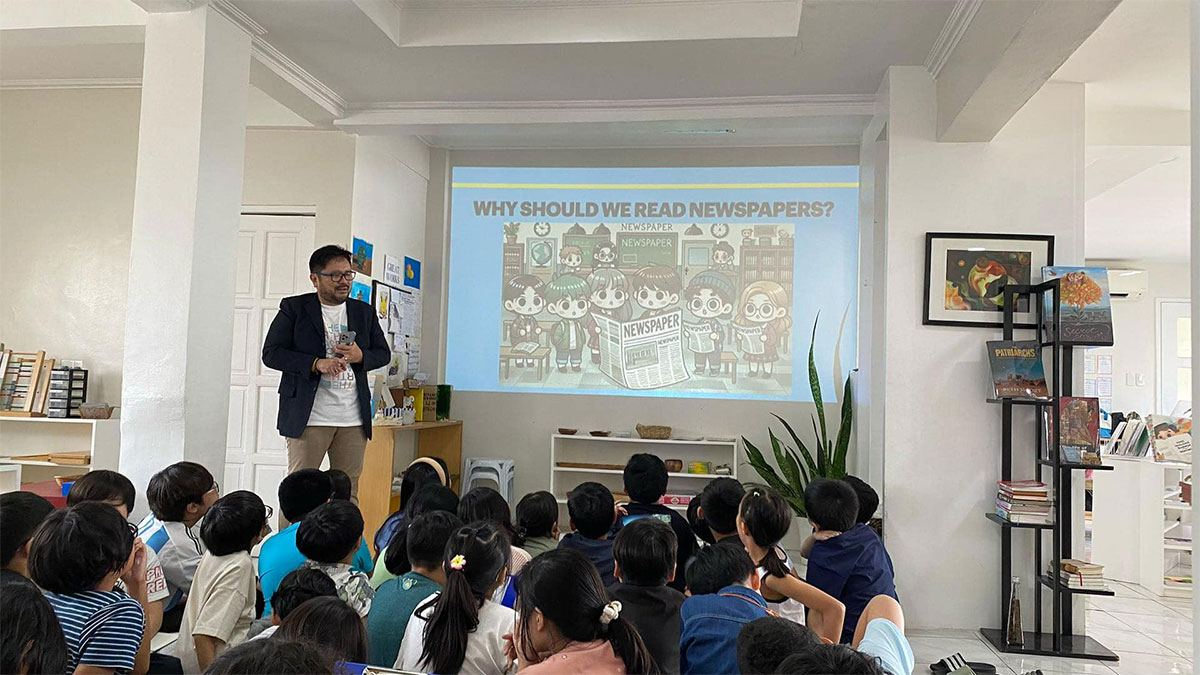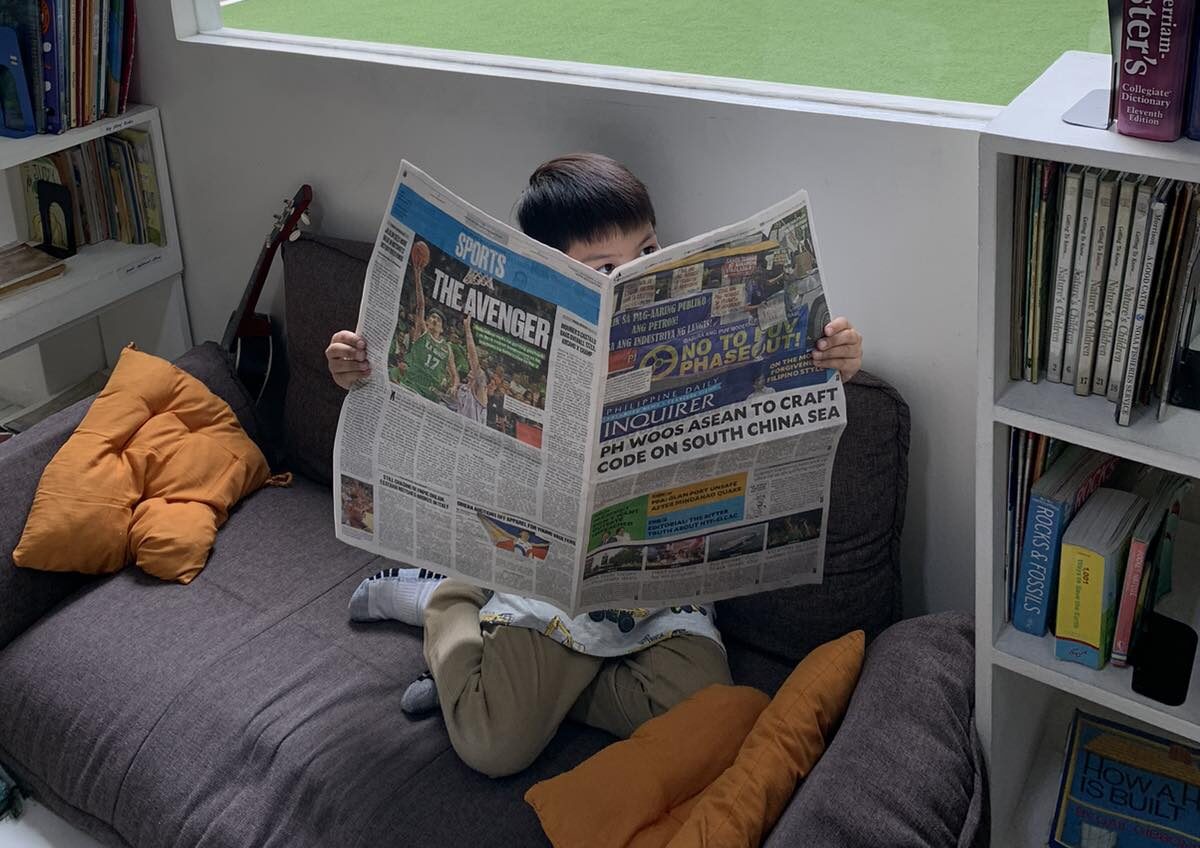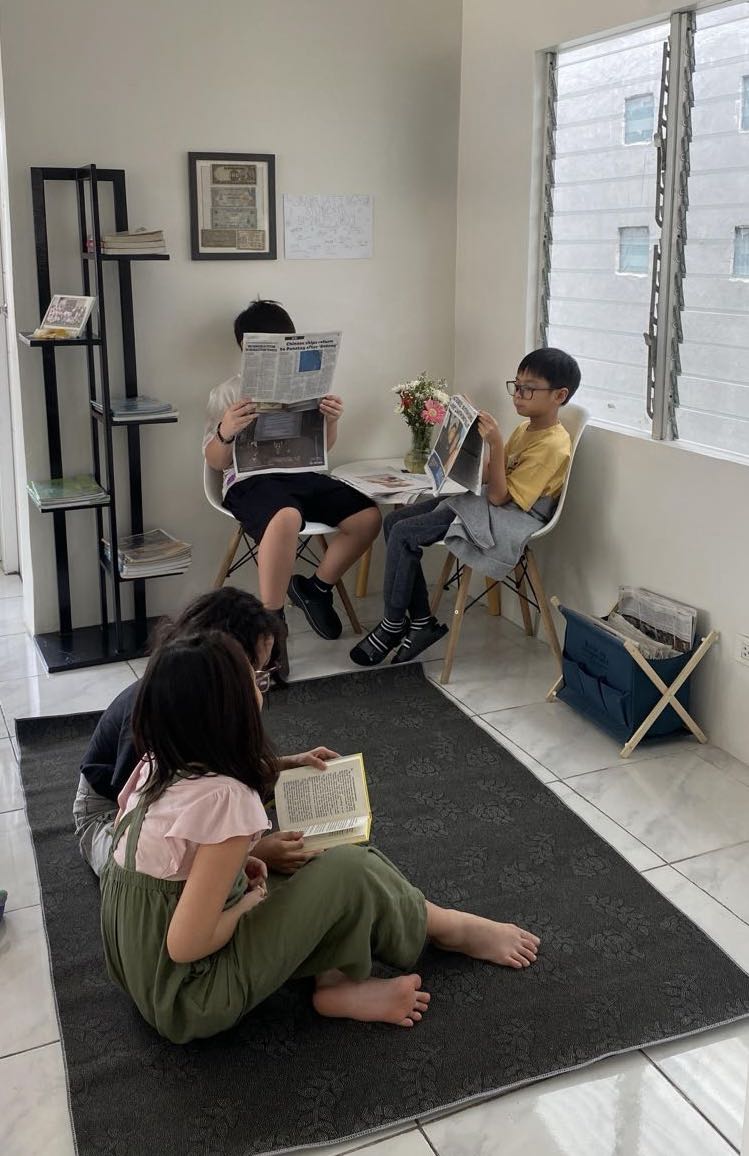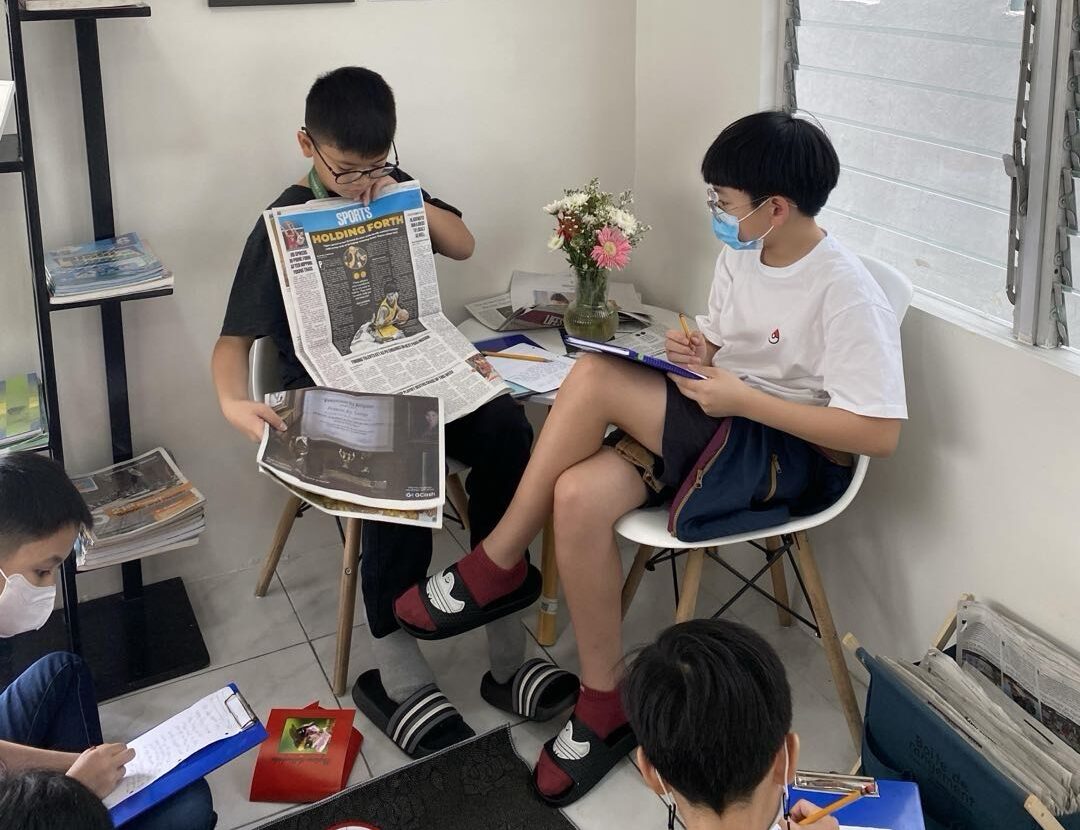Where print can stay in good (young) hands

AHEAD OF THEIR YEARS The author, who is also the paper’s Sports editor, talks about his work in the Inquirer, which gets sampled later by members of his audience. —Photos from Abba’s Orchard School and Con Cabrera/Contributor
MANILA, Philippines — On the second floor of Abba’s Orchard Montessori School’s campus on Bayani Road, Taguig City, a cozy reading corner rests against one side of the L-shaped classroom.
There, students are free—at any time during their class hours—to sit down, pick up a copy of the Inquirer, and read about current events.
The kids are age 9 to 11.
A floor below, in a classroom filled with students age 6 to 8, there is a similar reading space where a comfy bean bag rests next to a shelf of books. The young kids can also pick up a newspaper to check on the day’s headlines.
“This started when our elementary children began bringing national concerns into their group discussions,” Jusy Garcia, the head of the Bayani and McKinley campuses of Abba’s Orchard, told the Inquirer. “We’ve gone through a life-changing pandemic and a national election. There was a lot to talk about, and we didn’t want to keep them in a bubble.”
Garcia started the initiative with the school’s seven campuses in the National Capital Region.
“As a Montessori school, we want to encourage the children to speak their minds. But before we could do that, they must be well-informed in order to make sound opinions. Children must be given the keys to unlock doors of learning opportunities. We trust that the Philippine Daily Inquirer can give our children just that,” she added.
Enthusiastic reception
The reception among students has been enthusiastic.
“The first week they received newspapers, they were over the moon!” Garcia said. “At a time of artificial intelligence (AI) and fake news, providing a reliable source of information gives them a relevant seat at the discussion table.”
Now, that partnership has expanded to all of the school’s campuses nationwide.

LOOK, MA, NO SCREENS One can say that the so-called Generation Alpha at Abba’s Orchard Montessori School is on the same page with the much older regular readers of the Inquirer. —Abba’s Orchard School, Con Cabrera/Contributor
“[I]n every paper delivered to our doorstep each school day is a slice of verified information that would help our children become active thinkers,” she said.
The Inquirer paid a visit to the Bayani campus as part of the school’s program where they invite experts from their field and give the students a peek at their profession.
During the Inquirer’s visit, however, the discussion turned to the value of sourcing news from newspapers.
And it seemed like the students have learned a lot from their reading experiences.
“Newspapers help us deal with fake news.”
“There’s so much AI today and it’s hard to tell what news is real that’s why newspapers are important.”
“Newspapers keep us updated about things we should know.”
Those were just some of the comments raised by the young kids.
The teachers of the different campuses already have a collection of anecdotes about how the habit of reading newspapers daily has impacted their students’ lives.
Immersive experience
Bea Vergara and Joana Sapolato, the guides who handle the Level 2 students (Grades 4 to 6 in the traditional setting) recounted how, during an immersive discussion of martial law, the kids were given roles to play: police and military, political detainees, cronies, journalists, students, and citizens.
To make the discussion even more resonant, the guides took away some classroom privileges, like limiting the use of the reading corner to chosen students and the use of art materials from the art shelf.
When the students playing the role of citizens felt the burden of the restrictions and voiced their opposition to it, guess who came to their side?
From Cebu campus
“What’s surprising was the journalists started writing about what was going on in the classroom,” the teachers said. “Their idea of a newspaper has been modeled after the Philippine Daily Inquirer. They made their own headline and the front page contained a catchy drawing as the ‘photo’ of the article they wrote.”
“They saw how big of an effect the newspapers came to play during the immersive activity and how it also had a big role in shaping our history.”
Christine Amper, a guide from the Cebu campus, told the story of how newspapers have become part of her student’s discussions.
During a class trip, a student named Nathan surprised his peers with a currency update during a discussion about the cost of an item being sold online. “I remember it’s already P57.80,” he said when asked about exchange rates. The casual discussion led to broader reflections on the economy, with one student proclaiming, “Oh no, we’re doomed!”
Critical skills
In that same Cebu campus, students also turned to the newspaper when their interest was piqued by the filing of candidacies for next year’s national elections.
Eventually, their discussion led to a History discussion on the three branches of government and actual elections were held in the classroom.
The impact of newspapers extends beyond facts and figures, Garcia said, adding that teachers reported how students are mastering critical skills like distinguishing between fact and opinion. “They’ve learned to create objective opinions on social issues,” noted Garcia. “We’ve also used newspapers for vocabulary lessons, sentence analysis, and even blackout poetry.”
In the classroom handled by Blessy Salaritan and Angela Rivera, Level 1 kids (Grades 1 to 3) use the Inquirer to learn new words and for literary purposes, such as blackout poetry. But even when doing so, they eventually drift to the news.
‘Part of my journey’
For Garcia, the decision to have the Inquirer as the newspaper of choice for Abba’s Orchard’s campuses was a no-brainer.
“Writing has always been so dear to me. I started writing for the school paper when I was 10. Since then, I was in every school press conference and writing contest. The Philippine Daily Inquirer was part of my writing journey as my coaches would use it as our study material,” she said.
“Even if I wasn’t able to pursue that childhood dream of writing as a career, I’m more than fulfilled now because … I was able to pass on my love for writing to them. I do have the Philippine Daily Inquirer to thank for that. Now that the children at school are able to turn the pages of the same newspaper I read through during my student days many years ago, it’s truly a personal full circle moment for me just seeing them do the same,” Garcia added.

